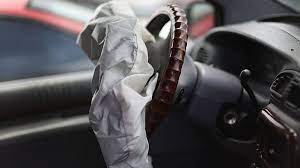According to documents made public on Friday, the National Highway Traffic Safety Administration (NHTSA) requested that auto supplier ARC Automotive Inc. recall 67 million air bag inflators because it considers there to be a safety issue.
The inflators, according to the car safety organization, present a disproportionate danger of death or harm.
Despite the rising number of ruptures, “ARC has not determined a defect that would require a recall of this population,” the NHTSA stated in its letter of demand to the Tennessee-based Corporation. As opposed to correctly filling the associated airbag, “airbag inflators that project metal fragments into vehicle occupants create an unreasonable risk of death and injury.”
Vehicles from General Motors, Stellantis, the parent company of Chrysler, BMW, Hyundai Motor, Kia Corp, and other manufacturers use ARC air bag inflators. Following a rupture in March that left a driver with facial injuries, GM agreed on Friday to recall nearly 1 million vehicles equipped with ARC air bag inflators.
The tentative finding of a flaw by NHTSA was rejected by ARC on the grounds that it was based on seven field ruptures in the US. The 67 million inflators that were manufactured over an 18-year period that NHTSA “then asks ARC to prove a negative – that they are not defective” The business announced that it would keep collaborating with the NHTSA and automakers to assess ruptures.
After a motorist was killed in a Hyundai vehicle in Canada in 2016, the NHTSA intensified its investigation into the more than 8 million air bag inflators made by ARC.
In July 2015, NHTSA began an investigation after receiving two reports of injuries.
According to the NHTSA, 67 million of the subject frontal air bag inflators for the driver and passenger, Delphi, which Autoliv purchased, produced roughly 11 million under a licensing deal from ARC, which produced the remaining inflators.
Inflators taken from destroyed or other cars have been put through a number of testing programs, but according to ARC, not a single rupture has ever happened.
The 67 million inflators were manufactured for the U.S. market on numerous production lines at various locations, and they were utilized in dozens of models by 12 different automakers. None of these firms have determined that a widespread fault affects this population, according to ARC.
According to NHTSA, ARC completed the installation of equipment intended to detect excessive weld slag or other debris on the production lines of inflators in January 2018. The NHTSA stated that it is not aware of any problems with ARC inflators made since then. Weld slag has not been established as the primary reason for the ruptures, according to ARC.
For more than 15 years, NHTSA has been investigating air bag inflator ruptures.
The largest auto safety callback in history has involved the recall of more than 67 million Takata airbag inflators over the past ten years in the US and more than 100 million globally.
Since 2009, Takata airbag inflators that can rupture and release metal shards inside automobiles and trucks have been linked to more than 30 deaths worldwide, including 24 U.S. deaths, and hundreds of injuries. Three Stellantis deaths occurred over a seven-month period, with the most recent being in a 2010 Chrysler 300 in July 2022.

















